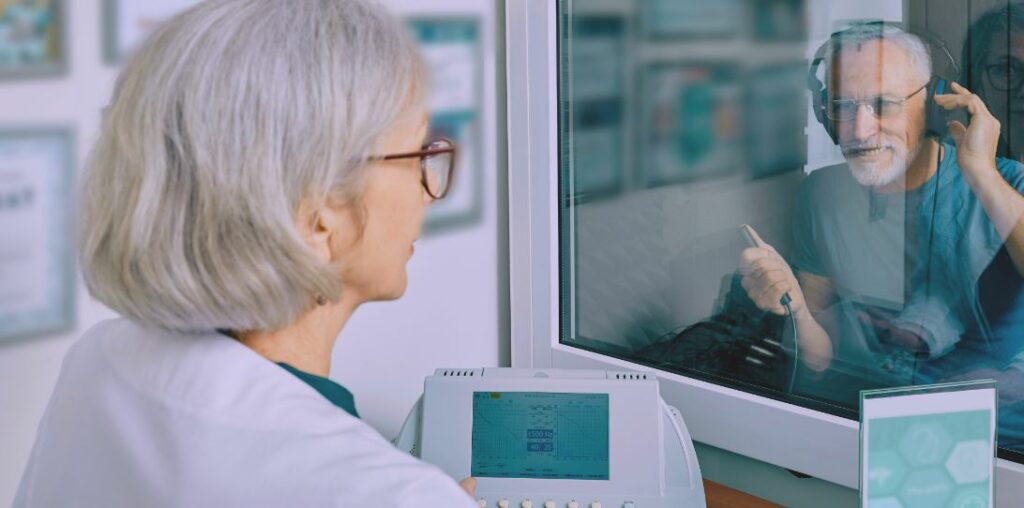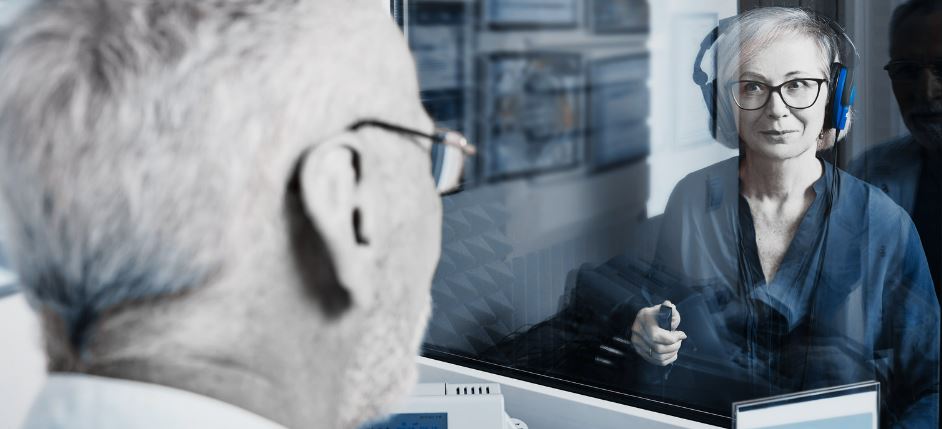Editor’s Note: On occasion Pathways will publish interviews with basic and clinical scientists. This month we feature a clinician who also has had long standing interest in the science as it influences the clinician. Ron Leavitt provides an interesting profile that we think readers will enjoy and from which we can learn.
Hi Ron, thanks for doing this interview !
1. Ron, I know you have extensive experience in many areas of audiology. Tell us about your early training.
I had the privilege of training at University of Arizona Department of Speech and Hearing Sciences as it was known at the time. I often think back to the amazing number of hours my professors spent with me. I am not just referring to the great audiologists like William Hodgson, Noel Matkin, Ted Glattke, and Paul Skinner who taught me so much about electrophysiological measurements, balance testing, electronics, physics, psychoacoustics, pediatric audiology, and APD.
More surprising was the time spent with speech pathology professors who also gave generously of their time and expertise. For example, Ralph Shelton would review any papers I had been preparing for publication, Richard Curlee would attend the classes I was teaching as a TA and would stay after to review my performance with constructive suggestions for improvement, Daniel Boone would suggest strategies for improving my clinical interviewing skills, and Ruth Anderson would take me to her office and make numerous suggestions as to how I could control unruly children in the speech-language clinic.
I really cannot imagine a better training program I could have attended.
2. How did you get started in private practice ?
Getting into private practice was something of an accident. I was teaching at Oregon State University and was Director of the University’s Hearing Clinic. Part of the OSU clinic assignment was to serve as the audiologist for the multidisciplinary team for children with special needs at the city’s only hospital. After about 10 years of work at the hospital, all employees were asked to sign a non-compete agreement.
Since I was already Director of the University’s audiology clinic, I could not sign the agreement. However, I had seen hundreds of patients that still required my care, so the hospital’s speech pathologist and I started our private practice and I stayed there to the present (almost 35 years now).
3. I know you have had a long and in-depth interest in diagnostics; how do you include diagnostics in your practice?
As you know, there are millions of people in this country who report listening difficulties that are not well reflected in the pure tone audiogram. Despite the ongoing discouragement I receive from insurance payers and a few others in our profession, we routinely perform immittance testing with ipsi and contralateral reflexes, 12-frequency DPOAEs, Q-Sin in the unaided and where applicable aided condition, gap detection and dichotic digits in addition to the usual tests.
We routinely refer balance/fall risk patients to the Portland Balance Clinic. When you see many patients with tinnitus and speech understanding complaints, and have as your only tool pure tone AC and BC testing with speech recognition in quiet, you are going to be sending a lot of people home with nothing more than a statement that they have normal (pure tone) hearing.

4. We have talked about your interest in CAPD/neuroaudiology – tell us about this…..
I would estimate that about one in three patients in our clinic report listening problems that are not supported by pure tone and speech in quiet results. These patients are having difficulty at home and at work. Often these patients will show a surprising amount of difficulty on tests of degraded speech or temporal processing ability. We also see many patients with noteworthy cognitive problems that are unknown by the referring physician.
As you have noted at numerous seminars and in your text on the subject, rehabilitation must be based on the specific area of problem. If the problem is not identified, therapy cannot be guided.
As a final thought, the Mayo Clinic paper that you and I were recently discussing has shown that speech in quiet and pure tone results are not correlated with all-incident dementia. Instead, these researchers showed that listening problems (APD) are the variable of interest.

5. What is your view about present day diagnostics in audiology?
I do not understand how we ever decided that home-based care was a good idea for our patients. If we are to abandon over 50+ years of medical/audiology research and systematic meta-analyses of data medically/socially/educationally/vocationally-based positive outcomes are sure to be jeopardized.
Further such home-based diagnosis and care will place audiologists in the “after the fact” care business when patients with unfavorably-altered brains, cognitive, vocational, educational and/or psychological problems show up at the clinic after years of misguided home care.
6. Ron, you have mentioned “home based diagnostics” – please explain more about the term.
As you know, in In March of 2017, the Over-the-Counter Hearing Aid bills were introduced in the U.S. House of Representatives and Senate, and were incorporated into the FDA Reauthorization Act of 2017. Since October 17, 2022 these devices have been legally marketed to patients. There is no requirement in this law for contact with an audiologist.
As such, many have obtained these devices without any diagnostic testing or formal performance verification (hence the term home-based diagnostics).
7. Ron, I know you have always had a keen interest in research, do you think practicing audiologists can be involved in research ?
In my days at University of Arizona, all the audiology professors saw patients on a weekly basis and I worked by their side for nearly 20 years. They all published extensively in addition to doing clinical work. So, when I was out on my own it only seemed natural that I would use my clinical experience to address research questions.
8. What is you view on the future of audiology?
I would say that we have more divergence of opinion going forward than in the past. Again, going back to my days at U of A, it was commonplace to have guest presenters from Mayo Clinic (Darrel Rose and Wayne Olsen), hearing aid industry (Sam Lybarger/Wayne Staab), ANSI (Roger Kasten), and a number of ENT/Otology presenters.
In general, there was a consensus that the current best-science of the day should be employed in clinical practice. Today, home-based diagnostics and care are supported by renowned medical centers and audiology programs and national law. I am unaware of any equivalent home-based diagnostics and care for related professions such as psychology, rehabilitation counselors, school counselors, physical or occupational therapists.
As you know from my previous comments, we as a profession apparently no longer believe that “Best Practices” as detailed by our national organizations are best for all.
—Ron, thank you for your time and important insights to your practice and our field of audiology!






